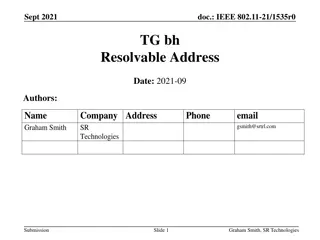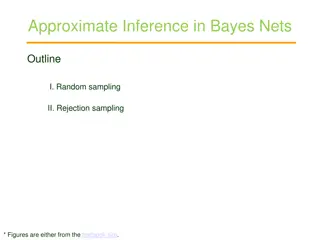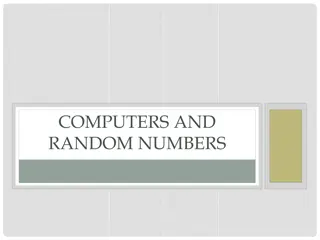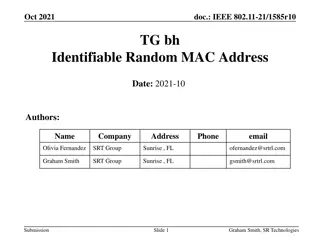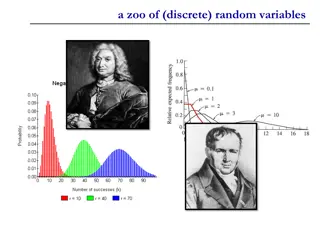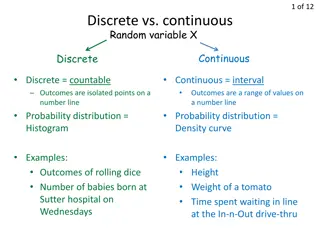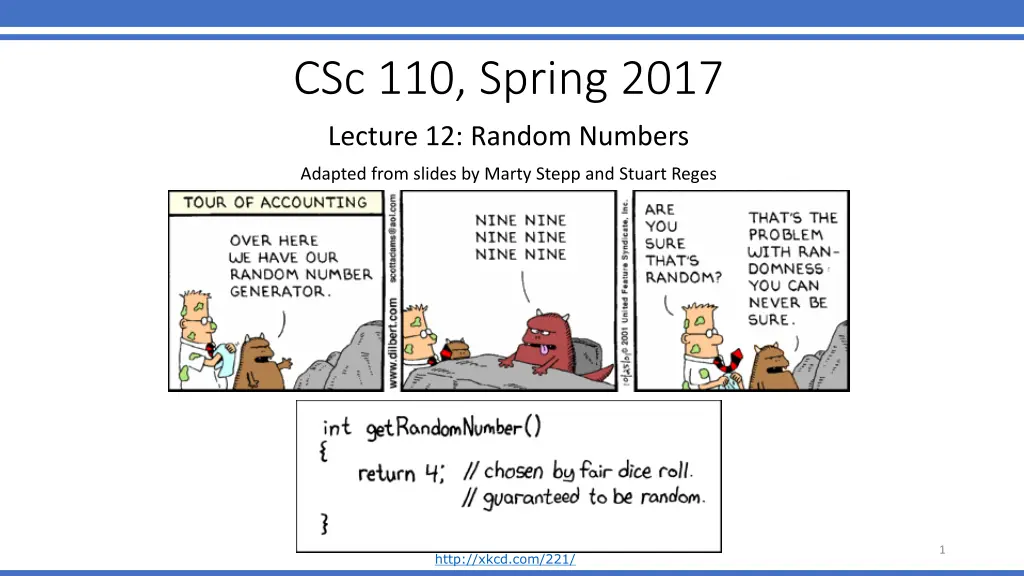
Understanding Randomness in Computer Science
Explore the concepts of randomness, pseudo-randomness, and generating random numbers in computer science. Learn about the Random class, pseudo-random number generation, and practical examples such as playing Rock-Paper-Scissors using random functions.
Download Presentation

Please find below an Image/Link to download the presentation.
The content on the website is provided AS IS for your information and personal use only. It may not be sold, licensed, or shared on other websites without obtaining consent from the author. If you encounter any issues during the download, it is possible that the publisher has removed the file from their server.
You are allowed to download the files provided on this website for personal or commercial use, subject to the condition that they are used lawfully. All files are the property of their respective owners.
The content on the website is provided AS IS for your information and personal use only. It may not be sold, licensed, or shared on other websites without obtaining consent from the author.
E N D
Presentation Transcript
CSc 110, Spring 2017 Lecture 12: Random Numbers Adapted from slides by Marty Stepp and Stuart Reges 1 http://xkcd.com/221/
Randomness Lack of predictability: don't know what's coming next Random process: outcomes do not follow a deterministic pattern (math, statistics, probability) Lack of bias or correlation (statistics) Relevant in lots of fields Genetic mutations (biology) Quantum processes (physics) Random walk hypothesis (finance) Cryptography (computer science) Game theory (mathematics) Determinism (philosophy) 2
Pseudo-Randomness Computers generate numbers in a predictable way using a mathematical formulas Parameters may include current time, mouse position In practice, hard to predict or replicate True randomness uses natural processes Atmospheric noise (http://www.random.org/) Lava lamps (patent #5732138) Radioactive decay 3
The Random class random functions generate pseudo-random numbers. Class random is found in random from random import * function name random() Description returns a random float in the range [0, 1) in other words, 0 inclusive to max exclusive returns a random integer in the range [min, max] in other words, min to max inclusive randint(min, max) Example: from random import * random_number = randint(1, 10)# 1-10 4
Generating random numbers To get a number in arbitrary range [min, max] inclusive: randint(min, max) Where size of range is (max - min) Example: A random integer between 4 and 10 inclusive: n = randint(4, 10) 5
Random and other types random function returns a float between 0.0 - 1.0 Example: Get a random GPA value between 1.5 and 4.0: random_gpa = random() * 2.5 + 1.5 randint(a,b) function returns a integer in the given range Example code to randomly play Rock-Paper-Scissors: r = randint(0, 2) if (r == 0): print("Rock") elif (r == 1): print("Paper") else: # r == 2 print("Scissors") 6
Random question Write a program that simulates rolling two 6-sided dice until their combined result comes up as 7. 2 + 4 = 6 3 + 5 = 8 5 + 6 = 11 1 + 1 = 2 4 + 3 = 7 You won after 5 tries! 7
Random answer # Rolls two dice until a sum of 7 is reached. From random import * def main(): tries = 0 sum = 0 while (sum != 7): # roll the dice once roll1 = randint(1, 6) roll2 = randint(1, 6) sum = roll1 + roll2 print(str(roll1) + " + " + str(roll2) + " = " + str(sum)) tries = tries + 1 print("You won after " + str(tries) + " tries!") 8
Random question Write a program that plays an adding game. Ask user to solve random adding problems with 2-5 numbers. The numbers to add are between 1 and 10 The user gets 1 point for a correct answer, 0 for incorrect. The program stops after 3 incorrect answers. 4 + 10 + 3 + 10 = 27 9 + 2 = 11 8 + 6 + 7 + 9 = 25 Wrong! The answer was 30 5 + 9 = 13 Wrong! The answer was 14 4 + 9 + 9 = 22 3 + 1 + 7 + 2 = 13 4 + 2 + 10 + 9 + 7 = 42 Wrong! The answer was 32 You earned 4 total points 9
Pseudo-code Main program while the player has lost < 3 games play a game ( if player lost add to losers else add to winners print the total points earned must get a result back) 10
Random answer # Asks the user to do adding problems and scores them. from random import * def main(): # play until user gets 3 wrong points = 0 wrong = 0 while (wrong < 3): result = play() # play one game if (result == 0): wrong += 1 else: points += 1 print("You earned " + str(points) + " total points.") 12
Pseudo-code Play a game get the random number of operands from 2 to 5 initialize the sum print the sum ( for the number of operands get a random number from 1 to 10 add it to the sum print "+" and the random number print "= " prompt for the user's guess if guess is correct return 1 else print out message to user with correct answer return 0 4 + 10 + 3 + 10 = 27 9 + 2 = 11 8 + 6 + 7 + 9 = 25 Wrong! The answer was 30 lay the post !) 13
Random answer # Builds one addition problem and presents it to the user. # Returns 1 point if you get it right, 0 if wrong. def play(): # print the operands being added, and sum them operands = randint(2, 5) sum = randint(1, 10) print(sum, end='') for i in range(2, operands + 1): n = randint(1, 10) sum += n print(" + " + str(n), end='') print(" = ", end='') # read user's guess and report whether it was correct guess = input() if (guess == sum): return 1 else: print("Wrong! The answer was " + str(total)) return 0 15


